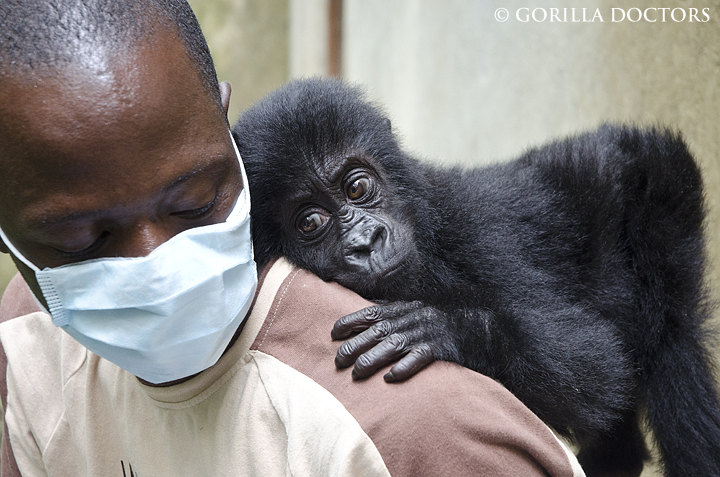Dr. Martin Reflects on His ‘Great Opportunity’ Working With Gorilla Doctors
By Gorilla Doctors Staff on Wednesday, April 29th, 2015 in Blog.By Michael Morales

Dr. Martin with orphan Grauer’s gorilla Isangi at the Senkwekwe Center in DRC.
Dr. Martin has all the qualities you would want in a veterinary doctor who works with endangered species.
“I’m a gentle man,” said the Gorilla Doctors’ field veterinarian, who works in the Democratic Republic of Congo. “I’m a patriotic person who really loves his country.”
Born and raised in Goma, Dr. Martin Kabuyaya Balyananziu received a degree in veterinary medicine from Lubumbashi University in 2009, later working for international non-governmental organizations and then for the government at the Veterinary Laboratory of Goma. He joined Gorilla Doctors in 2012 – a moment he remembers proudly.
“It was like a reality dream!” he said.
He originally applied for a similar post at Kahuzi-Biega National Park, where Gorilla Doctors was asked by the Park to assist with the recruitment process. Shortly after, Gorilla Doctors was in need of a new field veterinarian to assist Dr. Eddy. That’s when Dr. Martin was hired to join the team in DRC.
Even after three years with Gorilla Doctors, Dr. Martin still cherishes what a rare opportunity it is to work among the mountain and Grauer’s gorillas.
“Working with these exotic animals is not an opportunity given to everyone, so for me as a vet, it was and it still is an honor,” Dr. Martin said. “Working with Gorilla Doctors in particular to save gorillas’ lives is a great opportunity.”
Dr. Martin remembers the first time he saw a gorilla in the wild. He was mildly frightened, but being in the company of Dr. Eddy and the park rangers, he knew with time he would be able to approach the gorillas in his daily work.
“The greatest part of my job is every time we are doing an intervention,” he said. “We are facing danger, but we are also saving a gorilla’s life.”
Dr. Martin very much values the equipment they use in the field for gorilla interventions. By purchasing an item from the Gorilla Doctors Amazon wish list, donors can have a tremendous impact.
“The cameras are crucial,” he said. “Because without photography equipment we can’t share our work reality. This photography equipment allows us to have good visual diagnostics. We use the zoom of the camera to observe. We can give good reports with images that can be seen by everybody in the world on our blog.”
Phones are another crucial need.
“We must communicate between each other to exchange ideas and get technical advice before intervening or reporting cases,” said Dr. Martin. “We need to communicate with parks authorities, and we can use iPhones to send e-mails using the Internet from our phones.”
Even hiking boots are a great help to the teams, which often spend hours walking just to get to the gorillas that may need an intervention.
Doctor Martin hopes that Gorilla Doctors can “become bigger than it is now, enough to cover all the parks in the Rwanda, Uganda and Democratic Republic of Congo.”
He would even like to help cover other endangered wildlife species.


 Donate
Donate